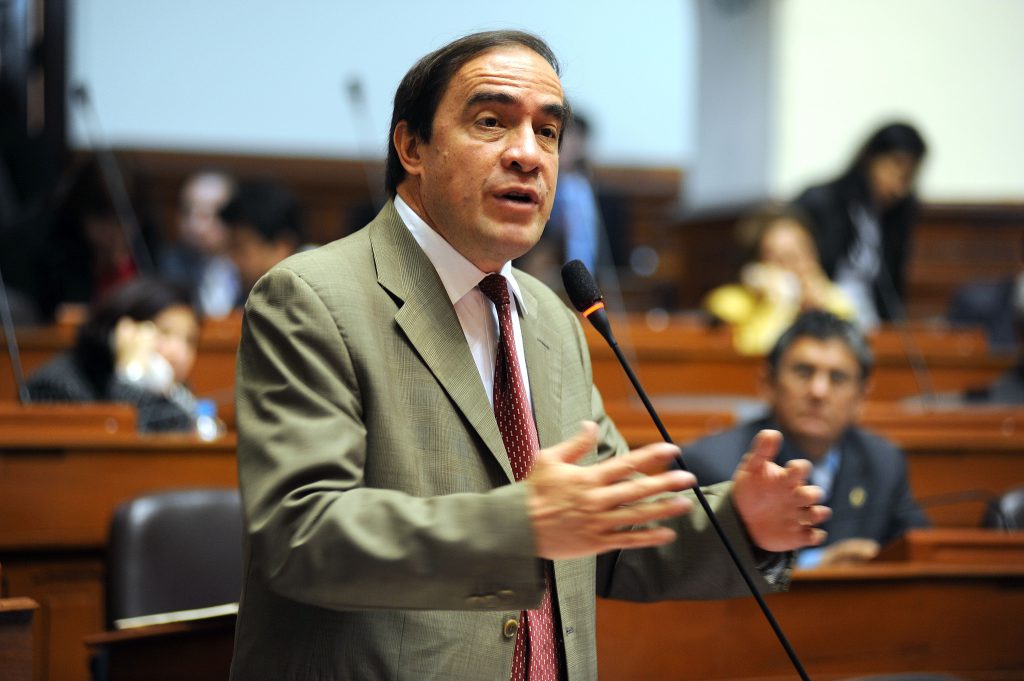Companies keep too much of Peru’s metal wealth, top candidate says

The front-runner in Peru’s presidential race said he’s ready to take a tougher stance against mining companies to ensure that more of the revenue generated by the Andean country’s vast mineral wealth stays in state coffers.
In telephone interview, Yonhy Lescano, 62, said he wants to close tax loopholes and negotiate profit-sharing agreements with multinational companies.
“Unfortunately, they are not leaving us the resources that they should,” he said of the mining sector, “and that has been hurting us.”
Lescano said he’ll propose a 50-50 profit sharing agreement between mining companies and the state
Lescano, a law professor and former congressman with the Popular Action party, is leading in all major polls ahead of the highly competitive April 11 first round. A survey by Datum published this week showed him with 14% of the vote — compared to 9% for his nearest rival, businessman Rafael Lopez Aliaga.
If no candidate wins at least half the ballots in the crowded race, the two top contenders will face each other in a June runoff. Lescano would beat his five nearest rivals in that scenario also, the poll found.
Lescano said he’ll propose a 50-50 profit sharing agreement between mining companies and the state, although he won’t unilaterally impose such a measure. He didn’t name individual companies, but BHP Group, Glencore Plc, Southern Copper Corp., Freeport-McMoRan Inc. and Anglo American Plc all operate in Peru.
“I’ll call for a dialog where we’ll have a technical evaluation — with figures and numbers — to determine the profits that should be staying in the country,” he said. “We want to find an equitable solution, we don’t want more than our fair share.”
Tumultuous politics
The election comes at a politically tumultuous time. Peru has had three leaders since November, when President Martin Vizcarra was ousted on corruption allegations. In all, six former presidents are being investigated for, or have been charged with, corruption.
A bellicose, fragmented congress has repeatedly clashed with the executive branch, while corruption scandals and the economic crisis have caused social unrest and widespread hostility to the political establishment. Peru was among the countries hardest-hit by the pandemic, leading to a record economic plunge last year, and to increasing anti-business rhetoric among politicians.
Peru is the world’s largest copper producer after Chile, and also a major exporter of zinc, gold and silver. The Ministry of Energy and Mines forecasts some $12.3 billion worth of investments in 13 mining projects through 2025.
Asked if his proposals might spook investors, Lescano said that mining companies shouldn’t see him as a threat and that their share of the profits will be “reasonable by international standards.”
Opposition lawmakers in neighboring Chile are also seeking a bigger share of the mining industry’s windfall, presenting a bill to introduce a royalty on copper and lithium sales.
Active central bank
During the interview, Lescano also reiterated his call for the central bank to play a more active role in regulating credit markets, and for the state-run Banco de la Nacion to compete against private banks to to bring down “usurious” interest rates. But he also guaranteed the central bank would remain “autonomous and independent.”
The candidate has adopted the Quechua phrase “Ama Quella, Ama Sua, Ama Llullama” — don’t steal, don’t lie, don’t be lazy — as his campaign motto.
He says he will push laws to bar corrupt politicians and government contractors from holding office or making deals with the state. Graft costs the country $8 billion a year, he said.
“There’s been too much thieving, too much treason, too much double-dealing in the government,” Lescano said. “That has left us so far behind.”
(By Jim Wyss)
{{ commodity.name }}
{{ post.title }}
{{ post.date }}




Comments